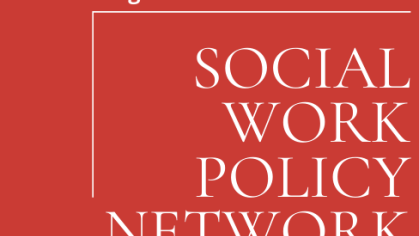Bridging the Gaps: Rutgers MSW Student Advocates for Intersectional Justice Through Research, Storytelling, and Accessibility
Advocacy doesn’t always look like holding a megaphone or organizing a protest. For Serene Rahman, a Master of Social Work (MSW) student at Rutgers School of Social Work, it looks like a deep dive into inclusive research, heartfelt conversations, and building networks in places often overlooked. It looks like advocacy shaped by commitment and lived experience—and a refusal to let barriers dictate the depth or reach of one’s impact.
“I think my advocacy comes in two primary forms: research and communication,” said Serene. “Because of my disability, I’m pretty limited in terms of traditional physical activism. I live in an area that’s completely unwalkable, and I also can’t drive. So, I’ve had to find other ways to contribute.”
Serene’s mobility limitations didn’t limit her dreams. Instead, they refined her approach. Where others might focus on organizing events or joining protests, Serene channels her energy into producing research that highlights voices and stories too often left out of academic discourse.
“As social workers, we know how existing research often centers majority experiences,” she explained. “Even as representation improves, there are so many underrepresented experiences, especially of individuals who carry multiple marginalized identities at once. Life at these intersections can already come with unique hurdles that are difficult to navigate, but the barriers that keep people from entering academic spaces only compound the problem.”
One of the most under-discussed of those barriers? Disability.
“People with disabilities face enormous challenges in higher education, even with accommodations,” Serene said. “Beyond the classroom, there’s a stigma that follows us into internship applications, assistantships, and academic conferences. How do you compete with someone who doesn’t have to factor in the energy costs or physical accessibility of every opportunity?”
It’s a question she’s wrestled with personally. “I’ve been lucky in many ways, and I’ve had privileges that helped me succeed, but not everyone does,” she said. “I want to bring that perspective into spaces where disabled and marginalized voices are often absent or excluded by design.”
Originally, Serene intended to pursue a degree in psychology but eventually found a more fitting home in social work.
“My research interests have always sat at the intersection between individual psychology and broader systems,” she said. “Social work offered that systems-focused lens I was missing, and Rutgers offered something even more unique: a program deeply rooted in justice.”
What drew Serene to Rutgers School of Social Work was its emphasis on Liberatory Consciousness, a framework that encourages critical awareness of injustice, empathy, and intentional action. For a student focused on the experiences of those living at the margins of identity and access, it was a perfect fit.
“I was enamored by how Rutgers framed its commitment to justice—not just in theory, but in practice. It wasn’t just about diversity; it was about actively working toward liberation.”
That passion for equity extends beyond academics. Serene sees communication, particularly storytelling, as a critical advocacy tool. “I love to talk to people. I love to know their stories and their struggles,” she shared. “Stories are how we understand the world. They teach us empathy, and they help us connect to people we may never meet.”
Understanding that not everyone has the energy to explain their experience repeatedly, Serene has made it a personal mission to serve as a kind of “ambassador”—someone who can help bridge gaps in understanding when others are too tired or too burdened to do so.
“There’s a lot of emotional labor involved in being asked to educate others about your identity or your struggle,” she said. “I try to take on that burden when others can’t. I want to be a safe space where people can ask questions and come to understand experiences they’ve never lived.”
Through forums, classroom discussions, and informal networks, Serene has prioritized building meaningful connections with faculty, staff, and fellow students. “In social justice, relationships matter,” she said. “Even if I can’t always be physically present, I try to make sure I’m helping others organize and connect in the ways that I can.”
Amid academic and advocacy commitments, Serene also prioritizes finding balance.
“I really believe it takes conscious effort,” she said. “I make time for things that fill my cup: coffee dates with friends, Dungeons & Dragons, video games, drawing, writing, music. Even just walking 20–30 minutes a day makes a difference.”
Her long-term vision for the profession of social work is both clear and inclusive. It centers on the people who exist at the margins of visibility, even within justice movements.
“All I really want to do is make a difference for individuals who’ve historically been neglected because they don’t fit into neat categories. The in-betweeners—those who are mixed-race, queer or disabled people who feel like they’re not ‘enough’ to claim their identity, children of immigrants who don’t feel at home in this country or their family's former one, people of faith who lack a community.”
“We need to broaden how we talk about intersectionality,” she said. “We need to create more spaces, truly inclusive spaces, where people who live at the crossroads of multiple identities are not just included but centered.”
And if that future includes using art and media, two of Serene’s other passions, to tell those stories? “That would be a nice little bonus,” she said.



